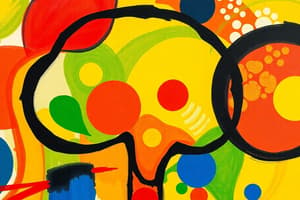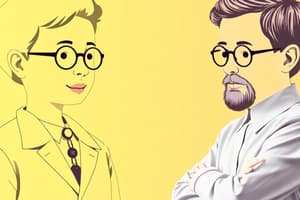Podcast
Questions and Answers
What did Piaget want to know about children?
What did Piaget want to know about children?
What the child thought
What areas does Piaget's theory encompass?
What areas does Piaget's theory encompass?
- Partially Empiricist (correct)
- Cognitivist
- Partially Nativist (correct)
- Activist (correct)
What is assimilation in Piaget's theory?
What is assimilation in Piaget's theory?
Fit new info into existing schema
What does accommodation involve?
What does accommodation involve?
What is the key concept of Vygotsky's theory?
What is the key concept of Vygotsky's theory?
What is the Zone of Proximal Development?
What is the Zone of Proximal Development?
What is scaffolding?
What is scaffolding?
How do Piaget and Vygotsky differ in their views on cognitive development?
How do Piaget and Vygotsky differ in their views on cognitive development?
Why do children play according to Piaget?
Why do children play according to Piaget?
According to Vygotsky, why do children play?
According to Vygotsky, why do children play?
Flashcards are hidden until you start studying
Study Notes
Piaget
- Known for challenging behaviorist views by focusing on children's thoughts and cognitive processes.
- A biologist who introduced the concept of "schema" to describe mental frameworks.
Piaget's Theory
- Represents a blend of activism, partially empiricist, and partially nativist perspectives.
Assimilation
- The cognitive process of integrating new information into existing schemas.
- This process can lead to cognitive disequilibrium when new information conflicts with previous understanding.
Accommodation
- The adjustment of schemas to incorporate new information.
Vygotsky
- Developed the sociocultural theory, emphasizing the crucial role of culture in cognitive development.
- Identified as an empiricist with elements of both active and passive learning theories, suggesting a continuous and discontinuous approach to development.
Zone of Proximal Development (ZPD)
- Defines the gap between what a child can achieve independently and what they can accomplish with guidance.
Scaffolding
- A teaching method where more knowledgeable individuals provide temporary support, enabling children to engage in higher-level thinking than they could on their own.
Differences between Piaget and Vygotsky
- Piaget focused on individual efforts in learning, while Vygotsky saw cognitive development as heavily influenced by social interactions and adult assistance.
Piaget's View on Play
- Children engage in play to practice skills, consolidate social competencies, and enhance interaction through the development of schemas.
Vygotsky's View on Play
- Emphasized exploration through play, allowing children to experiment and try new activities, fostering their cognitive growth.
Studying That Suits You
Use AI to generate personalized quizzes and flashcards to suit your learning preferences.



